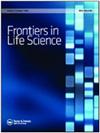代谢组学和蛋白质组学的最新进展综述——植物治疗学研究前景
Q1 Biochemistry, Genetics and Molecular Biology
引用次数: 13
摘要
近年来,药用植物作为一种潜在的生物活性物质来源,为开发用于初级卫生保健的新型中草药而备受关注。然而,植物药的作用机制还有待全面探索。在用于上述目的的可用策略中,代谢组学是其中之一,它导致产生包容性代谢物谱,提供对代谢物水平的诊断变化的清晰理解,从而通过阐明代谢组学途径对药物靶点进行治疗性监测。另一方面,与代谢组学相比,蛋白质组学也是处理系统蛋白质表达分析和分析药物治疗过程中不同生物标志物的有力策略。目前,1H核磁共振谱、质谱、傅里叶变换红外光谱、配备质谱的气相色谱、液相色谱耦合质谱、超高效液相色谱-质谱耦合多元统计技术,如主成分分析、偏最小二乘法、正交偏最小二乘法等,是广泛应用于代谢物谱分析的分析工具。而双向电泳和基质辅助激光解吸电离飞行时间-质谱是蛋白质组学生物标志物研究中最常用的分析方法。本文综述了生物标志物研究策略的最新进展和展望,阐述了生物标志物在草药可持续开发中的重要作用。本文章由计算机程序翻译,如有差异,请以英文原文为准。
An overview of recent developments in metabolomics and proteomics – phytotherapic research perspectives
ABSTRACT In recent years, medicinal plants have gained much attention as potential source of bioactives for the development of novel herbal drugs for primary healthcare. However, phytotherapeutic mechanisms of action of phytomedicines need to be explored comprehensively. Out of the available strategies for the said purpose, metabolomics is one, which results in the production of inclusive metabolite profiles providing a clear understanding of diagnostic changes in the levels of metabolites, leading to therapeutic monitoring of drug targets through the elucidation of metabolomic pathways. On the other hand, proteomics is also a powerful strategy to deal with systematic protein expression analysis and analyze different biomarkers compared to metabolomics during drug treatment. Currently, 1H nuclear magnetic resonance spectroscopy, mass spectrometry (MS), Fourier transform infrared spectroscopy, gas chromatography equipped with mass spectrometry, liquid chromatography coupled with MS and ultra-performance liquid chromatography-MS coupled with multivariate statistical techniques, such as principle component analysis, partial least square and orthogonal-partial least square are among the widely applicable analytical tools for metabolite profiling, whereas two-dimensional electrophoresis and matrix-assisted laser desorption ionization time-of-flight -MS are the most accepted analytical methods for proteomic biomarker investigation. The present review summarizes the recent developments and perspectives of the biomarker investigation strategies so as to elaborate their imperative role for sustainable herbal drug developments.
求助全文
通过发布文献求助,成功后即可免费获取论文全文。
去求助
来源期刊

Frontiers in Life Science
MULTIDISCIPLINARY SCIENCES-
CiteScore
5.50
自引率
0.00%
发文量
0
期刊介绍:
Frontiers in Life Science publishes high quality and innovative research at the frontier of biology with an emphasis on interdisciplinary research. We particularly encourage manuscripts that lie at the interface of the life sciences and either the more quantitative sciences (including chemistry, physics, mathematics, and informatics) or the social sciences (philosophy, anthropology, sociology and epistemology). We believe that these various disciplines can all contribute to biological research and provide original insights to the most recurrent questions.
 求助内容:
求助内容: 应助结果提醒方式:
应助结果提醒方式:


